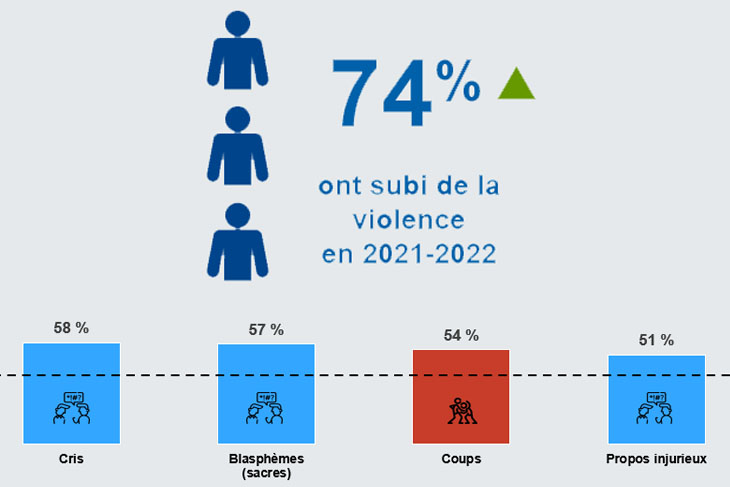30 September 2022

A survey conducted in 2021-2022 by the Ad Hoc Research firm in collaboration with the Fédération du personnel de soutien scolaire (FPSS-CSQ) reveals that violence has become a real scourge in our school environment, with results that show that 74% of the school support staff surveyed have experienced workplace violence.
“This survey was carried out four years after a 2018 survey and the problem has not been resolved, but has actually gotten worse,” says FPSS-CSQ President Éric Pronovost. The number of people who have experienced violence rose from 71% to 74% between 2018 and 2022.
Students continue to be the primary source of violence
Among the school support staff who report being victims of violence, eight in ten (81%) identify students as the source of the incident, making this the major cause of violence in the schools. Students are also the main instigators of physical and non-physical violence. Half of respondents blame them for physical attacks (48%) and two-fifths of the employees surveyed blame them for other forms of violence (42%).
Parents of students and work colleagues are almost equally cited as the second source of overwhelmingly non-physical violence (29% and 27% respectively cited by victims).
The sources of violence, however, vary according to the profiles of the victims
Victims who provide direct services to students (90%), those trained in crisis intervention (89%), and also women (83%), employees aged 45 to 54 (85%) and staff who have worked in education for 10 to 14 years (89%) report more violence inflicted by students.
School support staff face two types of violence
Half of school support staff (51%) report having been the victim of physical altercations and three-fifths of non-physical violence (61%). The levels of these two types of violence are the same as in 2018.
Employees in direct contact with students and those trained in crisis intervention are more exposed to these two types of violence.
Acts of physical violence come in the form of hitting (54%), the throwing of objects (46%), pushing (38%), scratching and scraping (32%), pinching (25%) and spitting (23%).
Acts of non-physical violence come in the form of shouting (58%), profanity or swearing (57%), abusive language (51%), intimidation and threats (41%), harassment (19%) and aggressive phone calls (16%).
Acts that are not condemned
Only 10% of employees who have systematically experienced violence file incident-accident reports. Conversely, three out of five victims (60%) never address it, five percent more than in 2018.
There are many obstacles to filing an incident-accident report. Lack of utility (47%) and minimization of the seriousness of the facts (32%) are the most cited reasons for not filing an incident report. Another common reason cited by a quarter of the victims who had never filed a report (25%) was the concern that it might damage their relations with management, and so they chose to self-censor.
1,617 people took part in the survey, which was conducted between April 22 and July 1, 2022. The maximum margin of error associated with the survey is 2.4% with a confidence level of 95%.
Urgency to act
FPSS-CSQ President Éric Pronovost believes that the results of this survey show that the situation has not improved over the past four years.
“Despite plans to address intimidation and violence, interventions with decision-makers and public awareness, things are even worse than before. What more do we have to do to sound the alarm? Actions must be taken immediately in our schools and educational establishments to correct a situation we can no longer tolerate, because the health and safety of school support are at stake,” says Éric Pronovost.
The causes need to be addressed
Pronovost believes that solutions must be found without delay to try to prevent as much as possible the continuation of such unacceptable conditions.
“Several reasons might explain the surge of violence in our schools and establishments. With less staff to provide direct services to students, it is not possible to do as much prevention as we would like, and it is more difficult to intervene promptly. Decision-makers also need to take the situation seriously. We must stop saying it’s part of the job and reject unacceptable conditions which need to be addressed. We need concrete actions!” says the President of the FPSS-CSQ.
